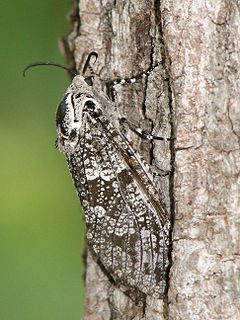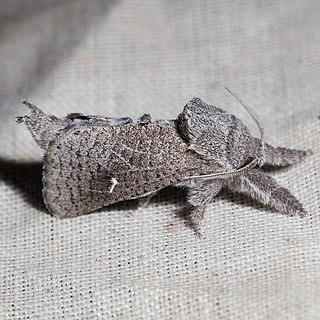
The Cossinae are the nominate subfamily of the Cossidae. The caterpillars of several Cossinae species, such as the carpenterworm and the goat moth, are significant pests. On the other hand, in Chile the caterpillars of the Chilean moth are collected on a commercial scale for sale as fishing bait and terrarium pet food; they are usually called "butterworms" in international trade.
Comadia is a genus of moths in the family Cossidae first described by William Barnes and James Halliday McDunnough in 1911.
Fania nanus is a moth in the family Cossidae. It was described by Strecker in 1876. It is found in North America, where it has been recorded from Arizona, Louisiana, Mississippi and Texas.
Comadia bertholdi, the lupine borer moth, is a moth in the family Cossidae. It is found in the United States, where it has been recorded from Washington, Colorado, Wyoming, Arizona, California, Nevada and New Mexico.
Comadia dolli is a moth in the family Cossidae first described by William Barnes and Foster Hendrickson Benjamin in 1923. It is found in North America, where it has been recorded from Arizona, California, Nevada and New Mexico.
Comadia henrici is a moth in the family Cossidae. It is found in North America, where it has been recorded from California, Arizona, New Mexico, Colorado, Nevada and Utah.
Comadia intrusa is a moth in the family Cossidae first described by William Barnes and Foster Hendrickson Benjamin in 1923. It is found in North America, where it has been recorded from New Mexico, Arizona and California.
Comadia redtenbacheri is a moth in the family Cossidae. It is found in North America, where it has been recorded from Mexico and southern Texas.
Comadia suaedivora is a moth in the family Cossidae. It is found in North America, where it has been recorded from California.
Comadia subterminata is a moth in the family Cossidae first described by William Barnes and Foster Hendrickson Benjamin in 1923. It is found in North America, where it has been recorded from Arizona, Utah, Colorado and New Mexico.
Comadia alleni is a moth in the family Cossidae. It is found in North America, where it has been recorded from California.
Comadia arenae is a moth in the family Cossidae. It is found in North America, where it has been recorded from California.
Comadia speratus is a moth in the family Cossidae. It is found in North America, where it has been recorded from California.
Comadia albistrigata is a moth in the family Cossidae first described by William Barnes and James Halliday McDunnough in 1918. It is found in North America, where it has been recorded from Arizona, New Mexico and Texas.
Prionoxystus piger, the baccharis carpenterworm moth, is a moth in the family Cossidae. It was described by Augustus Radcliffe Grote in 1865. It is found in Florida and Cuba.

Givira marga is a moth in the family Cossidae first described by William Barnes and James Halliday McDunnough in 1910. It is found in North America, where it has been recorded from California and Arizona.

Givira minuta is a moth in the family Cossidae first described by William Barnes and James Halliday McDunnough in 1910. It is found in North America, where it has been recorded from southern Arizona.

The Zeuzerinae are a subfamily of the family Cossidae.
Morpheis clenchi is a moth in the family Cossidae. It was described by Donahue in 1980. It is found in North America, where it has been recorded from Arizona. It is also present in northern Mexico.



